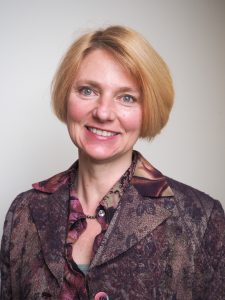June is Pride Month in the US, a period to spotlight and support the LGBTIQ+ community. As these students and their caregivers navigate increasingly hostile environments, Professor Melissa Luke was asked what role can school counselors play in addressing health and safety concerns and the creation of inclusive environments?
 Luke is Provost Faculty Fellow at Syracuse University and Dean’s Professor of counseling in the School of Education.
Luke is Provost Faculty Fellow at Syracuse University and Dean’s Professor of counseling in the School of Education.
As an ally for lesbian, gay, bisexual, transgender, intersex, queer and questioning persons, among other marginalized identities (LGBTIQ+), and an advocate for LGBTIQ+ youth communities in particular, I recognize that that LGBTIQ+ youth experience stigma and face barriers that impact their well-being (Dragowski et al., 2016; GLSEN et al., 2019; Luke et al., 2022) despite laws—such as Title VI of the Civil Rights Act of 1964, Title IX of the Education Amendments Act of 1972, Safe School Improvement Act, and Equality Act—to protect LGBTIQ+ youth from gender- and sex-based harassment and bullying (Hinduja & Patchin, 2020).
Moreover, I am acutely aware of the overt and covert mechanisms through which counseling training programs, as well as educational organization professional development initiatives, have contributed to this harmful context, but just as importantly, how they can redress and begin to ameliorate it as well.
Given that youth access the majority of their counseling services through public school contexts (Goodrich & Luke, 2016), there is particular importance for school counselors’ and other school-based mental health providers’ competence in working with LGBTIQ+ youth. Nevertheless, “researchers found that between 25.7% and 37.4% of participating school mental health providers received no training related to working with LGBTIQ+ youth in their graduate program” (Luke et al., 2022).
Exacerbating this situation, additional research has identified that two-thirds of providers observed that their graduate training only provided fair preparation in working with LGB students, while 73.7% specified fair or poor preparation working with transgender students (GLSEN et al., 2019). It is no wonder that LGBTIQ+ students continue to encounter high rates of hostile school environments that include bullying; biases; harassment (GLSEN et al., 2019); negative attitudes or behaviors of the school community and ecological context (Bruner et al., 2019; Luke & Goodrich, 2015); and absence of best practice within school counseling programs (Luke et al., 2011; 2013).
“Counselors who are not competent at supporting LGBTIQ+ youth and neglect to provide supportive and affirming spaces—as well as responsive counseling interventions recognized as best practice—are not meeting their ethical obligations.”
Yet, counselor training programs—as well as organizations through which post-graduate professional development training takes place—have an obligation to ensure the clinical and cultural competence of the professional counselors and other professionals working with LGBTIQ+ youth, their families, and allies across their ecological contexts (Bruner et al., 2019; Goodrich & Luke, 2016; Luke et al., 2022).
Over the past year, however, we have seen increasing numbers of state legislation challenging professional counselors’ and other school providers’ culturally responsive interventions with LGBTIQ+ youth through so called Don’t Say Gay bills and other attempts to ban Social Emotional Learning (SEL). That said, counseling organizations (i.e., American Counselor Association (ACA), American School Counseling Association (ASCA), American Mental Health Counseling Association (AMHCA)) are united in agreement that counselors have both clinical and ethical responsibilities to create and maintain safe, inclusive, and supportive counseling environments for LGBTIQ+ youth.
Concurrently, counselors also called to monitor and continually expand their own multicultural knowledge, awareness, and skills to promote a socially just counseling context that brackets their own values and reflects their client’s cultural, religious worldview (Gilbride et al., 2016; Luke et al., 2013a; 2013b; Luke et al., 2016) as part of their ethical responsibility. Such efforts include counselors’ recognition of the impact of privilege, prejudice, and oppression on themselves and their clients, particularly those who are LGBTIQ+ (ASCA, 2016; Asplund & Ordway, 2018; Goodrich & Luke, 2009). Thus, counselors who are not competent at supporting LGBTIQ+ youth and neglect to provide supportive and affirming spaces—as well as responsive counseling interventions recognized as best practice—are not meeting their ethical obligations (Luke et al., 2022).
As a first step to redress potential deficiencies within graduate training (GLSEN et al., 2019; Jennings, 2014), professional counselors and other providers working with LGBTIQ+ youth should consult the growing literature identifying the efficacy of systemic and advocacy‐focused interventions (Beck et al., 2017; Goodrich et al., 2018; Luke & Goodrich, 2015; Luke et al., 2022; Simons et al., 2018).
For example, perspectives on LGBTIQ+ youth development and best practices for working with LGBTIQ+ youth in schools can also be informative (Luke et al., 2017; Goodrich et al., 2013; Singh et al., 2017) for professional counselors and supervisors, as well as the programs, organizations, and institutional contexts in which they work with LGBTIQ+ youth.
In addition, Supporting Safe and Healthy Schools (Kosciw et al., 2020) illuminates how selected school mental health professionals created accessibility for LGBTIQ+ youth, maintained support, improved safety, and created inclusive spaces. Clinical and ethical competence in working with LGBTIQ+ youth is not conceptual or aspirational in nature, rather recognized best practices in working with LGBTIQ+ youth—including responsive intervention—often has life-changing implications (Goodrich & Luke, 2016).
Learn more about Syracuse University School of Education’s counseling programs:
